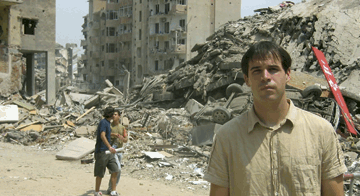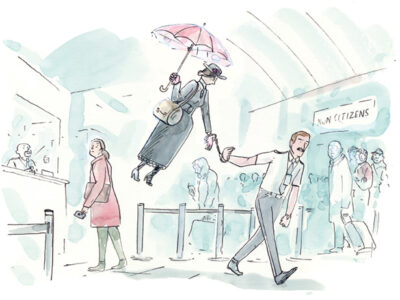
A recent Penn grad experiences a Middle East war at close hand.
By Spencer Witte | My rent, $120 a month for a tiny room that needed repainting, was past due and my Damascus landlord was getting anxious that I wouldn’t be coming back at all. I’d been across the border in Beirut for 33 days of a war and 13 days of a fragile ceasefire. It was an extended stay with my girlfriend, Iman—much longer than the three-day weekend I had planned.
I arrived in Beirut just before midnight on July 13. It was in time to take in a distant and still burning Rafiq Hariri International Airport from my taxi’s passenger side window. And it was some four hours before I’d hear the approaching Israeli Air Force and, unable to suppress the curiosity, make quick moves toward our seventh floor balcony in East Beirut. From there, I was able to track the intersection of falling first-rate explosives and failing and futile anti-aircraft fire. On the horizon, between a neighboring apartment building and a local hospital, a massive plume of smoke was appearing over Beirut’s southern suburbs. In the coming weeks it would reappear with frequency.
My decision to cross the border in the first place was rash to say the least. I had come to Syria in mid-February to expand on the two years of Arabic I had taken while at Penn, and I was only four days away from beginning a job as an English teacher for the American Language Center. I figured the hours spent teaching basic English would offset the many hours I spent struggling to learn Arabic. Whereas I have a reasonable facility with English, I could expect my Syrian students to speak terribly. It would be a total role reversal. A daily ego boost.
For a 24 year-old American studying in Syria, the day I left Damascus represented an unspectacular Thursday schedule that looked a lot like the days that preceded it. Nowhere had I allotted time to voluntarily make myself a passenger in a taxi heading toward an impending war.
And for reasons that included my safety as well as her independence, my New Hampshire-raised girlfriend, Iman, advised against my doing so. We exchanged concerned text messages and phone calls as the day’s events unfolded. Were we looking at a conflict similar to the 1993 Operation Accountability—when attacks on Israeli soldiers inside of occupied southern Lebanon as well as rockets landing inside of northern Israel gave way to a week-long intensified exchange? Or were we looking at something more open-ended with far greater implications?
Katyusha rockets sent hurtling toward Haifa at around 8 p.m. provided an emphatic answer and prompted a text message from Iman to come hurtling my way:
“Hezbollah just hit Haifa. That increases the odds that they’ll hit here tonight.”
Inside of an hour, several T-shirts, a few pairs of jeans and perhaps some of Iman’s objections had been stuffed into a nylon laundry bag. I was on my way to Beirut.
The prospect of Iman being in a city under siege while I sat studying flashcards three hours away had seemed to be a skewing of priorities. On that basis, my hasty move toward Beirut was a decision I could stand behind. It nonetheless looked nonsensical when paired up with the realities of air strikes—the true powerlessness of those on the ground when all the action is taking place overhead.
In fact, to soften the edge of this vulnerability, Iman and I resorted to a ritual we’d end up repeating again and again throughout the war. If we listened to a bomb fall elsewhere, one of us had been responsible for punching it away. If we didn’t hear any bombs fall, well, then, ditto. In this way, we took turns keeping danger at arm’s length, both knowing full well that at any given moment fate was ultimately out of our control.
We registered with the American embassy and consulted our families through daily e-mails and costly long-distance phone calls. We debated contingency plans and seriously considered leaving Lebanon altogether several times. As a contributor to the Lebanese-based newspaper, The Daily Star, Iman watched many of her colleagues make the arduous determination between evacuating and staying put. The entire staff resolved to stay on. Six of the eight interns, however, hedged their bets, boarded a boat and left the country.
E-mails started pouring in encouraging me to do the same. Some were from family members. Others from friends. And some were from complete strangers spread all over the U.S. Sentiment ranged from the heartening (“Keep your chin up”) to the precautionary (“Keep your head down”) to the ominous (“You’ll be lucky if you keep your head”).
This new correspondence, the overwhelming majority of which came from well-wishers, was a product of a blog I kept for the FOX news website. It ran for over a month under the working title, “An American in Beirut.”
(The way this happened was that the editor of FOX’s site, Steve Bromberg, is a resident of my hometown of Nyack, New York. He got word of my whereabouts through a finely tuned suburban gossip network and contacted me shortly thereafter with an e-mailed proposal.)
At no point was I treated with any particular hostility as an American. This proved true in predominantly Christian East Beirut and mostly Muslim West Beirut, as well as in Dahiye, a ravaged suburb of the capital, and Baladiyya al-Abassiya, a beleaguered southern village, which I visited after the ceasefire.
Instead, 33 days of war and 13 days of a truce put me on the receiving end of a unique progression of assumptions. When I arrived in Beirut, I was understood to be a tourist waiting to be evacuated. Within a week and a half, I had become a tourist who missed his boat. A few days thereafter, I was implicitly a member of the press corps and, by my final week in Lebanon, most guesses put me in the category of aid worker.
In reality, throughout the conflict my role changed very little: I was a civilian weighing rumors and discussing the potential consequences of the day’s news. I was factoring Iman’s safety and my safety into every decision. I was trying to strike a balance between normalcy—which was occasionally possible for those living in East Beirut—and compassion for the quarter of Lebanon’s population which was displaced, and for which normalcy was not at all a possibility. At the end of every day, when Iman had finished writing for the paper and I had finished composing my blog entries, we were happy if our apartment had running water and consistent electricity.
Hezbollah, on the other hand, witnessed a more tangible evolution—with far greater implications. After providing the force that ended an 18-year Israeli occupation of Southern Lebanon in 2000, some would argue it had fought the Israeli army to a standstill six years later. Having proven its military competency, Hezbollah is currently scrambling to extend its political legitimacy and demonstrate an equal ability to rebuild. And ironically, it’s doing so even as significant opinion in Lebanon blames the organization, at least in part, for having to reconstruct the country in the first place.
Hezbollah had already doled out an estimated $150 million to cover housing damages and victim compensation by the time Lebanese Prime Minister Fouad Siniora had shifted his attention from international diplomacy efforts to the realm of reconstruction. Much of that money is believed to have come from Iran, but it matters little to the desperate individuals who are on the receiving end. Likewise, by the time Prime Minister Siniora took the opportunity—nearly a week into the ceasefire—to tour the destroyed suburbs surrounding Hezbollah’s headquarters, he was witnessing an efficient clean-up operation that was well under way.
I had walked the area two days before. Residents were salvaging what they could, even as Hezbollah’s bulldozers and construction crews pushed the rubble that used to be homes and businesses into neat piles. Martial-themed music blaring from stereos drowned out the Friday call to prayer and provided a curious soundtrack to the effort.
A concurrent and massive public-relations campaign is moving along just as quickly. Bright red Hezbollah billboards now dot the country’s roads and compete for an audience with advertisements for the “Smoother than Silk Laser Hair Removal System” and Botox treatments.
The signs are everywhere and seemed to go up overnight—the day the ceasefire took hold, Hezbollah was publicizing its victory, simply for having survived. And this sentiment certainly didn’t end at the border. When I left Damascus back in July, the only victory being talked about was Italy’s in the World Cup final. But 46 days later, after crossing back into Syria, I find that even the cell-phone providers have come up with a way to get Hezbollah into their advertising schemes. “Congratulations to the Resistance. Congratulations to Lebanon. Congratulations to Syria,” reads a Syriatel billboard right outside Bab Touma Square—a two-minute walk from my house in Damascus’ Old City. Here, in this predominantly Christian neighborhood, photographs of Hezbollah leader Sayyid Hassan Nasrallah have suddenly appeared in storefront windows, creating an unlikely pairing with the pictures of Jesus Christ that predated this summer’s conflict. Even an ostensibly apolitical walk to the sweets shop provides an opportunity to buy a Hezbollah-themed birthday cake.
After paying my landlord $120 in late rent, I walked up the two flights of stairs to my tiny room. In my absence, it had been used by a family of Lebanese refugees who’ve since packed up and returned home. I pushed open the door and found the room had been repainted. But clearly that’s not the only thing around here that’s changed.
As a Penn student, Spencer Witte C’05 majored in history and lettered on the baseball team.




